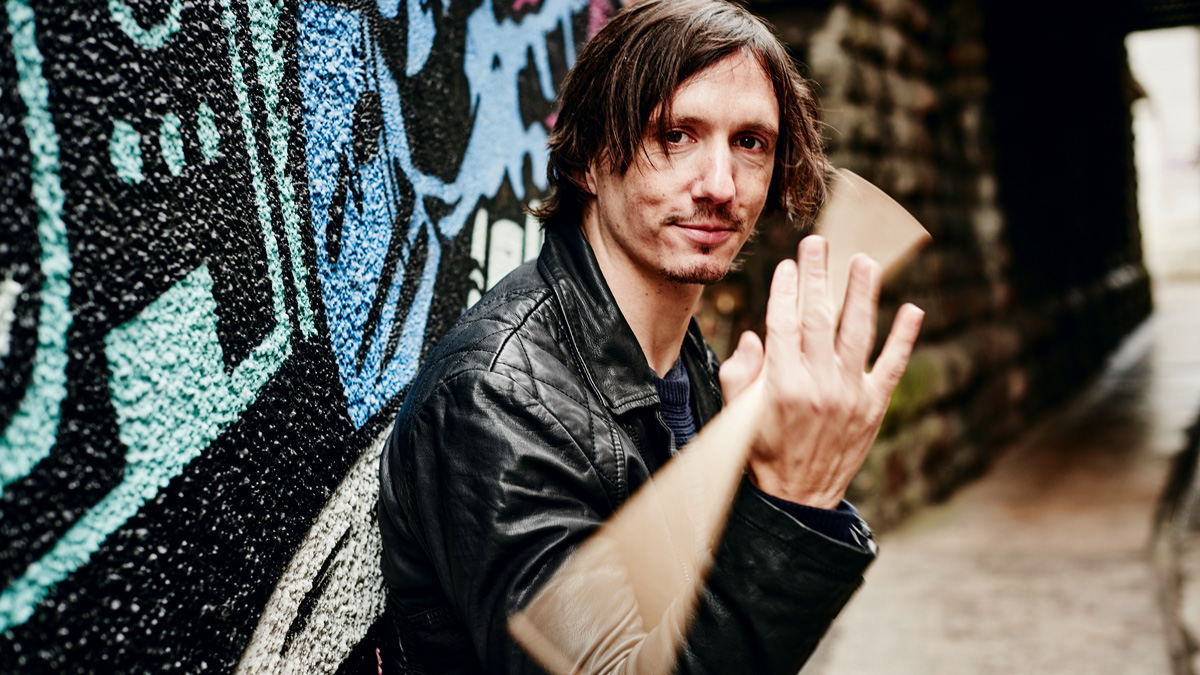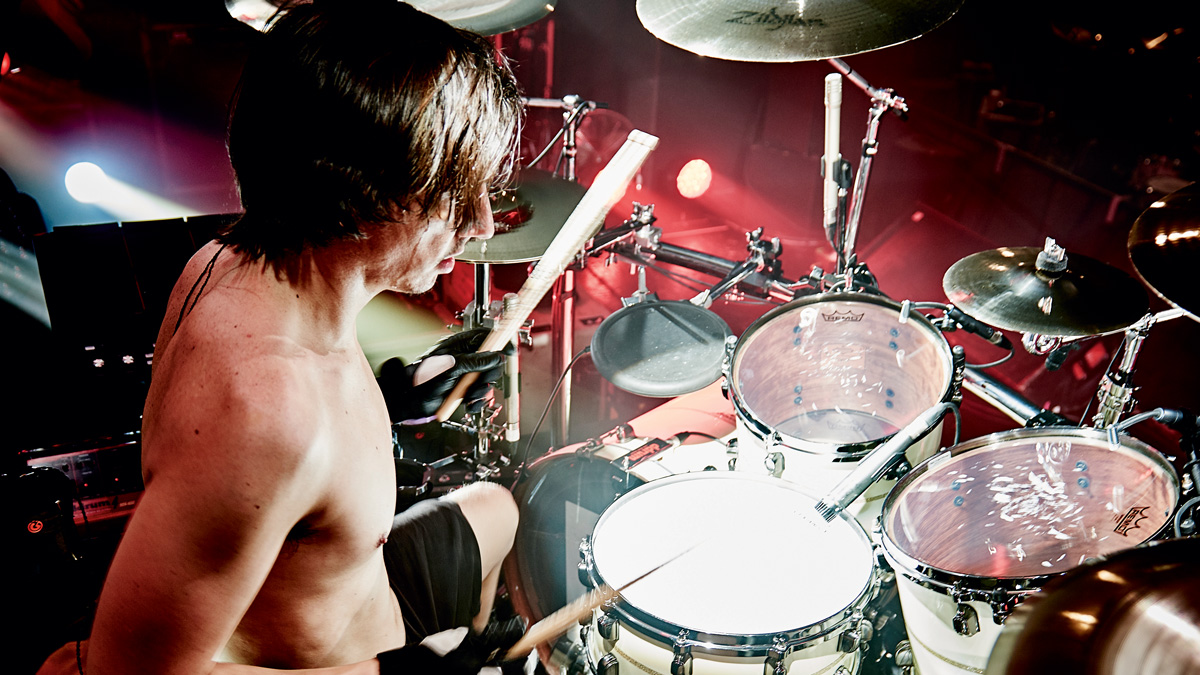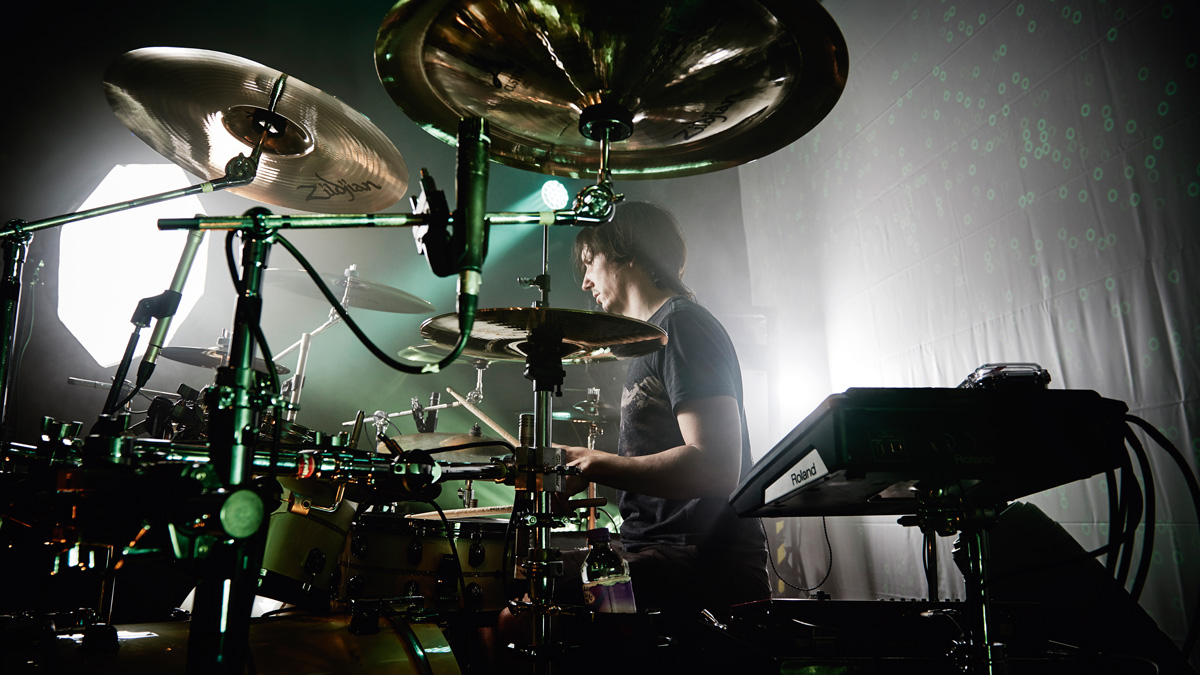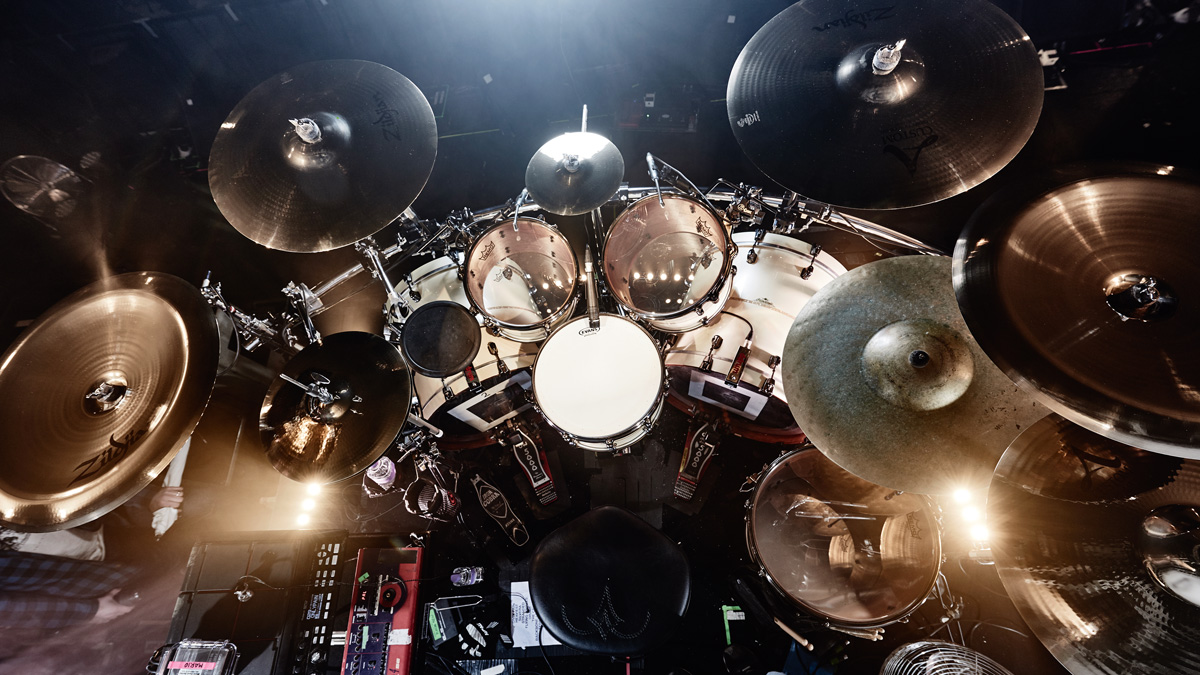Gojira's Mario Duplantier reveals all about his astonishing technique
Modern metal drumming hero talks

Gorjia's modern metal hero
Overnight success is increasingly becoming the only route to making an impact in the music business - write a hit, make a splash and ride the wave.
But the heavy metal world is a different beast and headline bands like Mastodon, Slipknot and Lamb Of God have worked hard for years to become masters in their field, just like their forebears Black Sabbath, Iron Maiden and Metallica did before them.
Something that also unites each of these bands is the calibre of their drummers - Nicko, Lars, Brann Dailor, Joey Jordison et al are all icons in their own right, blending virtuosity and originality with personality behind the kit. While drummers of this pedigree are rare, there’s a new name now dining at metal’s top table; and he earned his stripes early. To tell his story, we need to head to the south west corner of France, to a small coastal village called Ondres.
In a lone house set in the woods a driven young Metallica fan named Mario sat behind his first drum kit and set about imitating his hard-hitting heroes like Sepultura’s Igor Cavalera, Sean Reinert of Death and Metallica’s Danish whirlwind Lars - pretty advanced stuff for an 11-year-old.
Where most metal drummers might settle on the same tired blast beats and recycled double-bass licks, Mario was determined to be more of a creative force. Case in point: when perfecting his double bass-drum technique, Mario spent years studying pedal action, muscle use and motion to refine his approach. He has become one of the most precise and consistently fast double bass drum players in modern metal. The devil really is in the detail.
Between a brutal practice regime, exposure to jazz drumming and a diverse range of influences, a metal drumming monster was born. Then, at just 14, Mario embraced the musical chemistry he shared with his guitar-playing older brother Joe, and Gojira sprung to life (following a name change from Godzilla in 2001). Between debut album The Link and 2016’s astonishing Magma, the band has risen to dominate the metal world - much the same transformation their heroes Metallica made between Kill ‘Em All and the Black Album.
Mario and Gojira are justifiably proud of their latest release. The band decamped to a new HQ in New York - built by Joe Duplantier - and meticulously crafted every note on the album. The result is 10 tracks of spacious, dramatic and finely-tuned heavy-metal gold. Grammy nominations, excellent reviews and sold-out shows are all proof of this labour-intensive approach, and the band’s continued upward trajectory meant it was no surprise when Mario walked away with Rhythm/MusicRadar’s Best Metal Drummer 2016 award.
Backstage at Bristol Academy during Gojira’s recent UK tour we meet a man with obvious pride in his band’s career to date, particularly this most recent chapter.
What was your childhood like?
“I grew up 7km from Bayonne in a small village called Ondres, with my brother. It’s by the ocean, by the mountains and it’s all about nature. We were also really isolated where our house was, in the middle of the forest by a big lake, with no neighbourhood. On the video for Low Lands from Magma we shot some video over there. You can see a drone at the end, it’s exactly where we grew up, where we composed most of our albums.
“We were five minutes from the ocean so I was there every day at the beach, watching the waves, even during winter time. It’s a great place to connect with nature, but not really with the culture, so we had to self-educate. We would listen to bands from the US and UK.”
Sounds like a beautiful place. Which bands were you listening to early on?
“My mother was American. She was from Wisconsin and grew up in Los Angeles. She was always playing The Beatles, Tina Turner, Michael Jackson. It was not like we were raised by French parents only. My mother had a big impact on our musical culture. After the Beatles my brother fell in love with Metallica and I grew up just listening to Metallica around 11 years old. That was my first shock.
“It was the biggest thing in my life. Through those cassettes and listening to this music we started to dream. My brother and I knew we needed to play music.”
How did you discover drums?
“My brother started playing guitar with a friend at school, he had his own band. I was just 11 or 12 years old. He is five years older than me. Because I was very close with him I was always hanging out in his bedroom and just watching him playing guitar and being really into it. One day, when I really fell in love with Metallica, I took some chopsticks and started to beat everywhere on the table in my room.
“My mother came in and said, ‘Are you interested in drums?’ We jumped in the car to the first music store in the village and we bought a kit.”
After the Beatles my brother fell in love with Metallica and I grew up just listening to Metallica around 11 years old. That was my first shock
How quickly did you develop?
“At 12 years old I started my own band with a friend from school. We played Nirvana covers, Metallica covers and Sepultura. When I turned 13 I was really into death metal. I was very curious about the technique and fascinated by the ability to play fast and do so many tricks. Early on I knew I had this curiosity and perfectionist inside of me. I started my own death metal band with my friend.
“My brother was not into death metal at this time, but one year after this we decided to make our own band together. We both played in bands but we got frustrated because we were so ambitious and we weren’t getting that fulfilment with our separate bands.
“We were always complaining about our band mates! One day we decided to do a band together. We started Godzilla [the band’s name prior to Gojira] when I was 14 years old and he was 19.”
You’d only been playing for two years at this point. Did you take lessons?
“No, I just learned by myself. When I was 15 or 16 we released two or three demos. Then I thought I should take lessons. Again, my mother said, ‘You want to take lessons?’ We jumped in the car and found a drum school. The name of the school was Agostini. It’s a very famous teaching method in France. I took lessons with this guy for seven years. I learned how to play drums with this guy. I was really primitive before that.
“I learned how to play jazz, he taught me how to hit with finesse, less-is-more, dynamics. On the first day he said, ‘We will learn to play smoother.’ After that I started to do the paradiddles and all the rudiments. We had one hour of jazz, one hour of rock, one hour of Afro-Cuban. I learned a bit of everything.”
When I turned 13 I was really into death metal. I was very curious about the technique and fascinated by the ability to play fast and do so many tricks
Did you find you had limitations before taking lessons?
“Oh yeah, a lot. I was playing with my arm a lot, then I learned how to play with my wrists. I also learned you can have a lot of dynamics in the way you play. Sean Reinert of Death [introduced me to] a new dimension of drummer. Even before taking lessons I was listening to this guy and thinking, what is this jazz aspect and this finesse?”
Since 2001 Gojira has released six albums with considerable progression in your playing. What do you think of your drumming when you listen back to, Terra Incognita or The Link?
“I respect every moment of my career. I think it’s an evolution and sometimes I listen to The Link and think, ‘Wow, there are some cool fills.’ On the first album, Terra Incognita, I remember getting into the studio and I had a lot of pressure because it was the first album and it was so important. I only had three days to record everything so I panicked. I was changing my drum pedal every song. I f**ked up all my tracks. I can hear that I was not playing naturally.
“I learned a lesson from it. For The Link I worked a lot and I knew not to change my pedal just before a track. My tracks were better. At this time we didn’t use a lot of Pro Tools, we didn’t fix problems, it was very one-shot. Nowadays everything’s changed. We had one computer, no mobile phone, it was old-school days. It was a real performance when we were recording.
“For The Way Of All Flesh we started to incorporate more modern techniques so we used computers and we sometimes fixed problems on the double kicks. But still, before recording an album I’m working for months. I’m happy with each album, but it’s true that now I need to play simple.
“I have new needs, new desires. I want to serve the music the most I can and I also want to have more fun! I don’t want to impress anyone right now. With The Way Of All Flesh I was always thinking, ‘Look at this crazy pattern, everybody will be impressed!’ That’s not something that occurs to me anymore.”
Drummers can often be led by their ego which distracts them from playing musically…
“To be very honest, I always served the music in the past. I tried to make my fills at the right place, I didn’t go too crazy. But since Magma, since I became a dad, since I lost my mother, I had a revelation about myself; I don’t want to prove anything else. I don’t know why it happened on Magma, but it is a big change for the four of us. It’s hard to describe why. Maybe it’s also because 90 percent of our life is on the road and we’re getting older.
“When you’re playing challenging drum parts you suffer a little bit. Suffering is good also, but when you suffer for something you have to push the limit of yourself. It’s almost like a martial art. I like the discipline behind these drum parts. I love the fact I’ve always got to be on top of my game. I’m always practising my craft. Before going on stage you always have to drink water, be warmed up. It’s a real discipline. I love this, but not anymore. I don’t want to suffer anymore.
“The discipline for each part on the previous albums is huge. It’s a lot of preparation and a lot of stress. I’m such a perfectionist, when I go on stage I want to be perfect. Playing these parts is so demanding. For Magma I thought, ‘You know you can also go on tour and play music with a bit more fun, be more relaxed.’ Magma was this statement from the four of us. We felt the same. With death metal you have this pain, this complexity. When you feel you are changing yourself you find you need less pain, less complexity, less anger.”

"It feels good to play simple..."
The more simplistic, direct approach is definitely key to Magma. A track like Stranded features a basic riff and simple drumming, but it’s very striking and powerful. Like Pantera’s Walk.
“We thought about Pantera when we wrote this riff. It feels good to play simple. You have fun, the crowd enjoys it too. The four of us felt the same. Let’s do something less complex and just have fun. It’s still precise, but each detail is thought out.”
To record Magma you relocated the band’s HQ to New York. That’s quite an investment for a band to make. Did you intentionally change things up on this album?
“We wanted to change the rules of our process instead of recording everything in France, composing everything in France in our family house. We needed something new. Let’s change the rules a little bit. Joe has been living in Brooklyn for five years and he has two kids. It wasn’t easy for him to come back to France to compose and record. I also decided to live a new experience with my wife and daughter, so we moved to Brooklyn also. We lived in the same building with my brother so we could hang out every day, talking about the composition, talking about the visuals. We worked every day for one and a half years on this album. It felt great. All the previous albums were composed in France and this one was composed in New York. You can feel it.”
It’s every band’s dream to have creative space like that.
“Joe put a lot of energy into it. He built this room by himself. He spent two months working like crazy. He made something very good for the band, and now the studio is open for other bands to record there. For the next album we hope to record there as well.”
Aside from building your own studio, Magma was also self-produced. That’s a big undertaking.
“We composed altogether, we arranged altogether, but Joe was the producer of this album. [From past experiences] we learned which mistakes we should avoid. We know how to make better songs now. I spent a lot of time thinking about the songs by myself. I read some books on how to compose songs. I was really curious about whether there was a secret to making a good song. It’s still very spontaneous, but I was just curious.
“I was also interested in the mood of the melodies. Some notes are dark, some notes are not dark. When we started composing this album there was a lot of stuff that was very dark. Something was bothering me, but I didn’t know what. I figured it out that it was the melodic progression. I told my brother, ‘Can you try to make some more unusual melodies.’
“That’s when he came up with the main chorus riff for Stranded. It was not a dark riff. We thought about every detail for the first time.”
The two Grammy nominations, sold-out shows and widely positive reviews for Magma must have justified taking this meticulous approach?
“Before recording this album I told my brother we needed to go very deep into the details. On the previous album we didn’t go deep enough. If you release an album where 50 percent of the songs are great, nobody will really talk about it. If you release an album with 100 percent great songs, where every detail works, it will be a success.
“I really told my brother we needed to go super-deep on the length, the dynamic, the melody, the rhythm. Every detail, I didn’t give up. We worked so hard. At the end we took off four songs. That’s why the album is a little shorter, because we only kept what was perfect for us. At the end of the day we got two Grammy nominations, so many good reviews, so it was a great thing to do. For the next album I will do the same.”

Raw energy
You recently won the Rhythm/MusicRadar Best Metal Drummer award, ahead of players like Tomas Haake, Lars Ulrich and Abe Cunningham...
“I couldn’t believe it. When I was nominated I was so proud, but when I won I thought it was a mistake. When I saw my face I went, ‘Whaaaat!’ It’s very subjective, and all these drummers deserved it. On Instagram I used it as an opportunity to make a dedication to all the drummers I loved. All those you mentioned deserved this also. I was very proud.”
Why do you think your drumming has resonated with so many people?
“I try to put so much of my soul in my way of playing, just pure fire. We have a song called Liquid Fire, and sometimes when I’m playing it I feel like I’m liquid fire. I’m not thinking about anything else anymore, I’m in a pure, present moment. When I play drums I feel free, like I’m flying, I don’t have to pay attention to my face, how I’m talking to people. It’s no longer a social thing, it’s just pure creativity. In our family we’ve always been encouraged to be creative and to be ourselves. When I’m playing drums I’m 100 percent connected to raw energy, really connected to myself. It’s just about me existing and expressing something.
We have a song called Liquid Fire, and sometimes when I’m playing it I feel like I’m liquid fire
“I feel so good when I play, almost like an animal, and I think people feel this. I put a lot of emotion into what I play too. Sometimes I cry. I put in all my joy, all my anger. Playing drums is a real therapy. It’s almost existential.”
Do you feel comfortable being labelled as a modern metal drum hero and do you feel any responsibility to be a role model?
“Yeah, I like it, but I don’t put pressure on myself. I just try to be myself. I’m enough of a perfectionist for myself, I’m very self-critical. I have high standards for myself and I set the bar high.”
Have you met many of your personal drum heroes and what did you learn from them?
“Lars Ulrich is always giving me lessons. Even nowadays people say he’s not so good, but in fact when I played live with Metallica I learned a lot. The way he stands up behind the drums, the way he’s always communicating something fun and dynamic. He’s a real showman. Abe Cunningham too. Just the way he plays so loud, it had a huge influence on me.” There are plenty of fans performing Gojira drum covers online, and lots of incredible performances.
Does that push you to raise your game?
“As I said earlier, I’m serving the music first. Depending on the evolution of Gojira, there’s two sides to my career: I practise my drums a lot and I’m practising the most I can, so I create a lot of complex patterns, but I’m not sure they will fit with the next Gorjia record. For now I’m just serving the songs the best I can. We will see on the next album if I can add some crazy stuff, but my goal is just to be in harmony with the band for now.”

The master technician
Moving onto your formidable technique, how did you develop your double bass drum chops and master speed and precision?
“Back in 2005 I created an exercise for myself doing paradiddles on the double kick. I spent a few months working two hours every day except for the weekend on my double bass. I knew I had to pass a new level. Playing on the fast tempos like 210bpm was okay, but when I had to play 190 or 180bpm it was more complicated because it was using another muscle. I decided I needed to be able to play 170, 180, 190, 200, 210 and 220bpm.
“I had to make sure I could deal with these tempos. I started a new exercise of just doing paradiddles for 30 minutes at a time. After that I was playing constant double bass for one hour. So 170, just straight singles on each foot for 10 minutes, 180 for 10 minutes, then end up at 210; just to find the right balance between the rebound, the movement of the pedal, my feet, and to find out which muscle is working. I analysed a lot, I recorded myself. I spent a few months working like this every day and it was a big change for me.
“Since 2005 I try to do one hour every day during the week. I always go back to this exercise. I start with the paradiddle and then for one hour I try to stay on constant double bass. The song From The Sky on From Mars To Sirius is an example of a song where I decided to keep the double bass going for five minutes. I do the same on Where Dragons Dwell. Because I was practising this technique at the time I introduced it to the music.”
How is your pedal set up to help you achieve this?
“The tension is fast, but the most important thing is the way I sit and the way I position my back, and if I play with my knees or with my ankle. After 200bpm it’s with my ankles, but if it’s around 180 I’m still playing with my legs and I can put a lot of power on it. As soon as it goes faster the energy moves.”
I’ve always used two bass drums. I tried a double pedal but I didn’t like the movement of the left pedal
Do you position your beaters close to the head?
“Yes, very close. Also, the fact I’m playing with triggers, I can play fast for a long time, I just have to find the right rhythm. I worked a lot on this, because you cannot f**k up when you have a trigger on the kick. Everybody will hear it. My kick drum head tension is very loose too. I’ve had the same set-up, pedals and everything, since 2003.”
Why do you use two bass drums rather than a double pedal and single bass drum?
“I’ve always used two bass drums. I tried a double pedal but I didn’t like the movement of the left pedal. It’s always a marginal difference in terms of feel with the extra pedal. And the two bass drums look cool!”
The left foot is often weaker with double drum players. What about you?
“I have so many examples of songs that started with a drum pattern then the riff came after, like Explosia from L’Enfant Sauvage, Toxic Garbage Island and The Art Of Dying from The Way Of All Flesh, Pray and The Cell from Magma.
“They all came from exercises I created myself to learn how to start a group of notes with the left foot. One of the perfect examples is at the end of Remembrance from The Link. I created some exercises for the bass player who was struggling on a part. This one I created in 2002, so I was already thinking about this. I knew it was tough to start on the left.”
What exercises do you use to keep your hands in shape?
“Right now I don’t have a teacher, so I spend a lot of time watching on the internet. I like watching the gospel chops guys. I always try to stay connected to the technique, to the groovy stuff. I practise my paradiddle a lot.”
Groove is a big part of what you do. What is the secret to playing good groove?
“As soon as it’s musical it works. My goal is to be musical and groovy. It’s just about the sound I can get on my ride, the ghost notes. It’s about feeling it. I’m not thinking too much about technique, but just that I want to make it musical. I love to hear a drum beat when it sounds so musical and tasty and colourful, but not forced.”
What’s your secret to playing with power, especially when playing fast parts such as a blast beat?
“When we started playing stadiums with Metallica or big festivals I thought I had to amplify my movements. I thought it was more visual. I really enjoy seeing Deftones playing very loud and Abe’s arms are going very high in the sky. I started playing a bit differently and more visually when we were playing huge venues and when we started using in-ear monitors. It was a big change because you can play very hard and not be affected by the sound because you’re so isolated. For the blast beat I also work a lot with the sound guy. I’m always asking him, ‘When I play a blast beat can you hear the snare?’ I put more power on the snare to make sure everyone can hear it. My goal is also to be efficient at the source of the sound.”
My goal is to be musical and groovy. It’s just about the sound I can get on my ride, the ghost notes. It’s about feeling it
How do you stay inspired to write creative drum parts?
“Now I’ve developed my own tricks, so it’s just like a game. When I’ve got a riff I want to jam around that riff. I’m still connected to a lot of music and everything has an influence on me – not only the music, but life and emotion. Now I just like to jam by myself and use my own technique and tricks and make it come alive.
"On the last album we recorded in a room where the sound was a bit boomy. I played with this when I was recording. When I was hitting the hi-hat I felt in the room it was very interesting, almost too noisy. So Magma is also the result of the room. I adapt myself to the condition. Sometimes on stage I can hear something specific with the acoustics so I will adapt my playing to that acoustic. I like to jam based around the room, be present on where I am, which people I’m with, the vibe in the room, and just adapt myself to these conditions.”
Your snare and kick have consistently amazing clarity and punch on stage and on record. Who or what influenced your drum sound?
“I would say the clean aspect of our music comes from death metal, because the signal has to be very clear. Bands like Meshuggah, Morbid Angel and Death had this. It’s very clear that our roots come from there. I have another influence which is David Silveria from Korn, on the album Issues. The sound was so natural. My goal is to mix a bit of this sound and the clean sound. The more we evolved the more I enjoyed the messiness! I want to put less information in my drumming so I can add a bit of charm to the drum sound.”
I'm MusicRadar's eCommerce Editor. In addition to testing the latest music gear, with a particular focus on electronic drums, it's my job to manage the 300+ buyer's guides on MusicRadar and help musicians find the right gear for them at the best prices. I dabble with guitar, but my main instrument is the drums, which I have been playing for 24 years. I've been a part of the music gear industry for 20 years, including 7 years as Editor of the UK's best-selling drum magazine Rhythm, and 5 years as a freelance music writer, during which time I worked with the world's biggest instrument brands including Roland, Boss, Laney and Natal.
